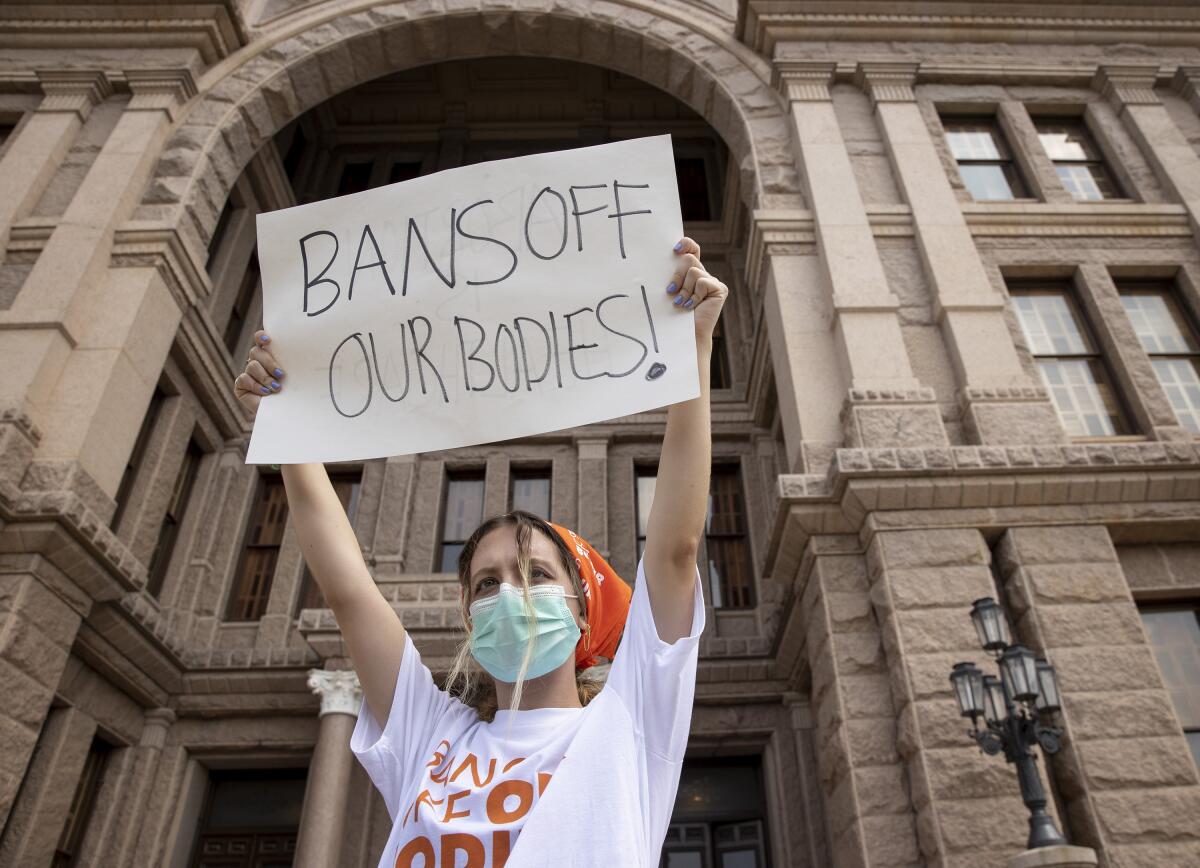Editorial: Finally, a judge does the right thing and blocks the Texas ban on abortion

- Share via
Finally, a voice of reason sounds from the federal bench. U.S. District Judge Robert Pitman on Wednesday temporarily blocked the reprehensible Texas law that has halted nearly all abortions in that state, calling it out for being, plain and simple, an unlawful and brazen end-run around the constitutionally protected right to a legal abortion.
Pitman was blunt in his assessment of Texas Senate Bill 8, a law that outlaws all abortions at the point when cardiac activity is detected in the fetus — which is around six weeks of gestation. The judge wrote that “this court will not sanction one more day of this offensive deprivation of such an important right.”
The ruling came as a response to an emergency request by the U.S. Justice Department for a preliminary injunction to halt the law after filing a lawsuit against the state of Texas, asserting that the law violates the constitutional right of women to seek abortions. Most women don’t even know they are pregnant at six weeks. Other states have passed similar bans on abortions in early pregnancy. But federal courts have generally blocked or overturned them as obvious violations of U.S. Supreme Court rulings that have established and upheld the right of a woman to get an abortion — without obstacles — up to the point of fetal viability outside her body, which is around 24 weeks of gestation.
But the Texas law is different, and more insidious, than those in other states because it was written by a state legislature hostile to abortion rights that is deliberately trying to evade judicial review. The law can be enforced only by private individuals suing abortion clinics and others. Texas state and local government agencies have no part in enforcing this law, which is why it avoided earlier legal challenges. Pitman blasted Republican lawmakers for crafting an “unprecedented and transparent statutory scheme.”
The law has crippled abortion clinics across Texas since it went into effect last month, forcing many women to travel out of state to seek abortions and putting strain on clinics in nearby states and, occasionally, beyond. However, it’s unclear whether Pitman’s ruling will spur many clinics to fully resume their operations. Clinics rightly worry that when Texas officials file an appeal, the 5th U.S. Circuit Court of Appeals will overturn Pitman’s ruling. That is a possibility, because it is one of the most conservative appellate courts in the nation and has already refused an earlier request from abortion providers and advocates to block the law before it took effect.
Still, it is heartening to see one judge cut through the nonsense of this law and tell the state that created it and empowered this vigilante force of private citizens to stop it. Abortion providers and advocates filed suit against Texas before the law went into effect Sept. 1— and also filed for an injunction at the U.S. Supreme Court. But they lost because the novelty of the Texas law apparently flummoxed five conservative justices, who all said it was unclear who in Texas should be enjoined from carrying out the law. Pitman saw it more clearly.
It’s also encouraging that the U.S. House of Representatives voted last month to approve the Women’s Health Protection Act, which guarantees the right to an abortion and outlaws unnecessary restrictions, which have sprouted across the country for years. And if U.S. senators respect women and the Constitution, they will vote to approve the act as well. (Something tells us not to hold our breath.)
For the time being, the federal courts are where toxic laws like the Texas abortion ban are being dealt with. The courts should follow Judge Pitman’s path and shut down the Texas law for good.
More to Read
A cure for the common opinion
Get thought-provoking perspectives with our weekly newsletter.
You may occasionally receive promotional content from the Los Angeles Times.










